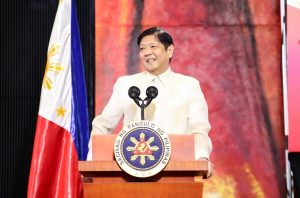Philippine President Ferdinand Marcos Jr. has reaffirmed that his government is open to purchasing oil and fertilizer from Russia, in order to alleviate the economic pressure of high global energy prices.
The comments, which Marcos made yesterday during an address at the Manila Overseas Press Club, are the latest sign that the Philippines is prioritizing its domestic economic situation over the international campaign to isolate the Russian government for its invasion of Ukraine.
“We take we take a very balanced view because the truth of the matter is, we may have to deal with Russia for fuel, for fertilizer,” said Marcos, who also serves as his country’s minister of agriculture, according to a report by Reuters.
The Philippines is just one of many countries that is attempting to deal with soaring inflation, due to constrained global supply that has been exacerbated by Russia’s invasion of Ukraine in February. The country’s statistics agency yesterday reported that annual inflation rose to 6.9 percent in September, its fastest pace in four years, led by the spiraling cost of food. The agency expects that the inflationary trend will continue this month.
The Philippine leader’s comments follow an interview that he gave to Bloomberg during his state visit to the United States late last month, during which he said that the Philippines may have a need to “approach Russia and say maybe they can loosen up and provide us with some fuel.”
Marcos’ position is unsurprising, and broadly reflects the stance of most Southeast Asian nations toward the Russian aggression in Ukraine. While not all have chosen to purchase Russian oil, only Singapore has joined the international campaign of sanctions against Moscow, and most appear less concerned about the conflict than its global economic ramifications.
The Philippines is not the only Southeast Asian nation casting its eye toward cut-price Russian oil. Indonesia has also raised the possibility of purchasing oil from Moscow, as it grapples with high oil prices that cost the government billions of dollars in fuel subsidies. Last month the government was forced to reduce the subsidy in order to ease pressures on the national budget, prompting a wave of protests from student groups and labor unions. In response, Energy Minister Arifin Tasrif said that Jakarta was open to buying cheap oil “from anywhere,” including Russia, in order to keep the price of domestic fuel under control.
Even if the Philippines ends up deciding against Moscow’s blood oil, Marcos’ comments hints at the balance that his administration will attempt to strike in an era of deepening strategic competition between the U.S. and its rivals, particularly Russia and China.
Since his inauguration in late June, Marcos has signaled a desire to rebalance Manila’s foreign policy after six years in which his predecessor, Rodrigo Duterte, spurned the U.S. and embraced China in search of financing for large-scale infrastructure projects. This has involved a rapprochement of sorts with Washington, during which he has affirmed the two nations’ longstanding security pact amid tensions with China in disputed parts of the South China Sea.
At the same time, there are clearly areas where Philippine and U.S. interests diverge, whether that be Marcos’ stated desire for stable and fruitful relations with China, or his desire to prioritize domestic economic considerations over the international campaign to isolate an aggressive and revisionist Russia. The U.S. can expect more fruitful relationship with Marcos than his predecessor, but it should not expect Manila to line up behind it across every domain.

































